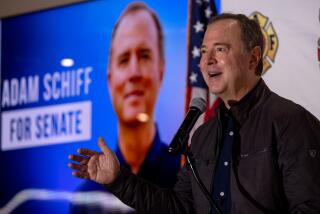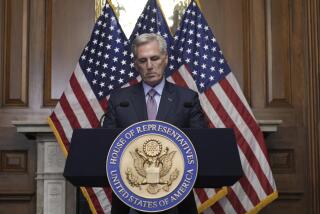The Still-Fighting Irishman
- Share via
“Do I dare
Disturb the universe?” -- T.S. Eliot, “The Love Song of J. Alfred Prufrock”
*
Former U.S. Rep. Robert K. Dornan walked to the microphone at the Sutton Place Hotel in Newport Beach in 1998 to deliver what most believed, incorrectly, would be his political farewell. He’d succumbed--again--to Loretta Sanchez, the savvy Democrat who had yanked his Orange County seat two years earlier while he was running for president. It was just after 11 p.m. and things were about to get ugly.
Dornan began with a slow burn. It wasn’t his fault that he’d lost. The real culprits were unfaithful Republicans; ungrateful voters; his former colleagues, Reps. Dana Rohrabacher and Chris Cox; the national party and the usual suspects: Latinos, liberals, assorted homosexuals. The ballroom crowd fidgeted as Dornan ranted. This was not how they wanted to end the state GOP’s worst election night in four decades--splattered with loser’s bile.
Matt Fong’s supporters, aching to give their losing U.S. Senate candidate some face time before the network news went off the air, finally booed and taunted Dornan to go home. He walked away, but not before one of his kids scuffled with a Fong supporter and an expletive-spewing Bob Jr. unloaded on a shellshocked Rohrabacher.
A subtle echo of that 1998 election night sounded March 2, when Dornan again was defeated in the Republican primary after deciding, at age 70, to challenge Rohrabacher for his seat. Few voters even noticed; Dornan hasn’t been a political player in California for seven years. His daily radio show, broadcast from his Virginia home and aired locally on a small, conservative station in Los Angeles, aired at the same time as Rush Limbaugh’s morning show, on which Dornan’s broadcast career once reached its zenith as Limbaugh’s guest host. Even his pundit gig on MSNBC had waned.
Dornan’s political denouement began its long, steady slide after 1992, the year he’d acted as a surrogate for President Bush the elder. He had traveled to 34 states for the campaign, and expected to be lauded and rewarded when Bush won. Bush lost, and the praise never came. He complained that he didn’t get the proper respect for his work on Bush’s behalf, nor did he think he had been taken seriously by Bush’s campaign team. He felt used, a pawn sent to prop up a moderate Republican for the red-meat crowd. And Dornan, who sat out the Korean conflict while in college but flew Air Force jets in peacetime, was furious that the GOP lost the presidency to Bill Clinton, a “draft dodger.” His bitterness was evident four years later, when Dornan launched his campaign for the presidency--a distraction many blame for his first loss to Sanchez.
The only media to give Dornan sustained coverage during his recent campaign against Rohrabacher was the alternative Orange County Weekly, which resurrected and serialized Dornan’s escapades while in office in order to poke fun at him. (In 1998, Dornan called the Weekly “Satan’s instrument”--a label the paper practically adopted as its motto.) Hobbled by dismal fundraising and Rohrabacher’s vow to never to be in the same room with him, Dornan’s campaign idled.
He tried to keep it alive by targeting his opponent’s views on Israel and the war on drugs--not exactly burning issues in the coastal district he wanted to represent. Dornan amped up his fabled rhetoric, calling Rohrabacher a loose-morals former pothead libertarian who was weak on security in a post-Sept.11 world and dangerously wrongheaded about the U.S. role in the Middle East. He hinted darkly about Rohrabacher’s “secret life,” whatever that meant. But by challenging an incumbent Republican, Dornan finally wore out his welcome among conservatives. The conservative press, in fact, offered some of the harshest views of the bombastic “Mouth of the House,” who once was their hero for accusing President Clinton of “aiding and abetting the enemy” during the Vietnam War. In January, commentator William E. Saracino wrote in the California Political Review that Dornan’s ill-advised rematch with Sanchez in 1998 energized the left and led to Democratic legislative gains in central Orange County. “Now, in 2004, ego rides again,” Saracino wrote. “Again, it is all about ‘me’ and the conservative movement takes a backseat.”
Dornan didn’t even attend the one campaign event that drew media attention--a protest against Rohrabacher’s Middle East policies--because he was pursuing a better offer: national exposure on Fox’s syndicated “Hannity & Colmes” television show to talk about Democrat John Kerry’s surging presidential campaign. As it turned out, the only red-faced rant voters will remember from 2004 will be Howard Dean’s.
Rohrabacher called Dornan unstable and obsessed, and the incumbent congressman’s supporters suggested that the real reasons behind the race were Dornan’s generous ego, his frustration over his low-watt radio career, or because family members, who have run most of his campaigns, needed the money they’d earn as paid staffers.
Dornan probably will return to what he feared the most during his 18 years in Congress--political irrelevancy. It hardly seems possible for those who remember the Dornan that was, and how it all began. In 1984 Dornan, who had moved from a Santa Monica district and used a Garden Grove motel room as his local address, won a congressional seat in central Orange County. On that election night, Dornan held court in a room off the Westin South Coast Plaza ballroom jammed with Orange County Republicans jubilant that they’d taken out Democratic incumbent Jerry Patterson. The large and beautiful Dornan family packed the stage and passed out Olympic-style medals to campaign supporters. At the microphone, Dornan was ebullient. He went on for what seemed like hours in a classic performance--engaging, amusing, angry, nostalgic, grandiose, searing, rambling.
On display was the Dornan many would come to recognize: the red-faced Irishman, thoughts tumbling from his mouth in a torrent of free association. His speech was steeped in historical and literary references, imbued with Yeats and Shakespeare and Sun Tzu. This was the Dornan who regarded his life within the hallowed context of history. In his mirror, he saw a warrior and a patriot, a kinsman to Thomas Jefferson and William Wallace--or rather, Mel Gibson’s portrayal of the Scottish hero in the movie “Braveheart.” He noted more than once the proximity of his April 3 birthday to the resurrection of Jesus Christ.
He leaves a mixed legacy. The most famous, or infamous, utterings from his long career were featured in two books: “Shut Up, Fag: Quotations from the Files of Congressman Bob Dornan, the Man Who Would Be President” and Michael Moore’s “Downsize This!” in a chapter called “I Try to Commit Bob Dornan.” But in 1996, long before the recent bitterness, Rohrabacher offered this fond send-off to the man who claimed to have swum the waters off Chappaquiddick Bridge to see for himself whether Sen. Edward Kennedy’s car accident story held up: “Congress will be a much less colorful and amusing place without him.”
All these years later, Dornan seems like the guy who gets in his car when the game is over but just won’t leave the parking lot. The only people left to mourn the political miscalculation of his run against Rohrabacher are his family and a handful of hard-liners. Why did he decide to take on a Republican incumbent--something he’d railed against when he was one--instead of enjoying his retirement and his 14 grandchildren? The best hint came from Dornan himself. As reported by the OC Weekly, the only news operation that covered his arrival at the Orange County registrar of voters to pick up his candidacy papers, Dornan arrived with a yellow legal pad upon which he had written himself a note: “RKD ... moment in history.”
More to Read
Get the L.A. Times Politics newsletter
Deeply reported insights into legislation, politics and policy from Sacramento, Washington and beyond. In your inbox twice per week.
You may occasionally receive promotional content from the Los Angeles Times.










